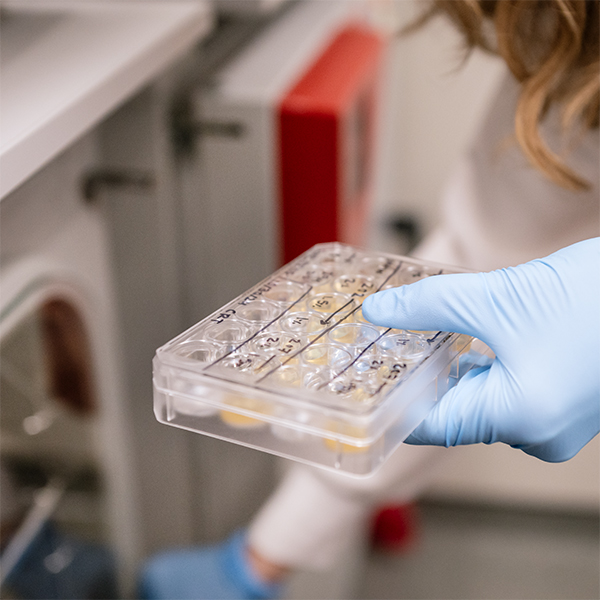You Can Shape the Future of Human Health with a Thoughtfully Planned Gift.
When you include Gladstone Institutes in your estate plan, you equip scientists with the resources to discover new treatments and cures for the world's most intractable diseases. An estate gift can also be an important part of your financial plan.
Ready to learn more? Our planned giving advisor, attorney Chris Nicholson, has been helping philanthropic individuals design their legacies for more than 25 years. He can answer your questions and walk you through every step. Reach out at any time.

Contact
Chris Nicholson
Director of Philanthropy
415.565.1008
@email

Your gift will support visionary biomedical research.
Your Legacy
What Can Thoughtful Estate Planning Accomplish?
Gladstone Institutes was originally founded with a planned gift.
J. David Gladstone, a real estate and shopping center developer, left an estate valued at $8 million in the 1970s, accompanied by one directive: support exceptional medical research with the potential to change lives.
Gladstone Institutes was officially established in 1979, focusing first on cardiovascular disease, then expanding to include four additional research areas: virology, neurological disease, data science and biotechnology, and genomic immunology.
The organization's original trust has been carefully managed over the years, growing more than tenfold and leveraging a 100x return. Today, researchers here are making breakthrough discoveries with a direct impact on human health, ensuring the fullfillment of J. David Gladstone's wishes.
We'll manage your estate directive with the same care.

Gladstone was established thanks to a planned gift from J. David Gladstone, who left his estate to support medical students interested in research.
Giving Options
Explore the Many Ways to Satisfy Your Philanthropic Mission
From a simple bequest to a complex trust, there are many ways to support transformative scientific research at Gladstone Institutes. Explore the opportunities here, and then when you're ready, start a conversation with our planned giving advisor.
Gifts for the Future
Wills or Trusts
Help to drive research breakthroughs by making a bequest to Gladstone in your will or trust.
Beneficiary Designations
Designating Gladstone as the beneficiary of a retirement, investment, bank account or life insurance policy is an excellent way to have an impact on the future of human health and may enable you to save on both income and estate taxes.
Gifts That Provide Income
Charitable Gift Annuities
Establishing a charitable gift annuity enables you to support Gladstone, receive fixed income payments for life, and potentially save on taxes.
Unitrusts
The benefits of a charitable remainder unitrust include the ability to make a significant gift to Gladstone, ensure steady income for yourself or another beneficiary, and avoid paying capital gains tax.
Gifts of Assets
Appreciated Securities
Donating appreciated stocks, bonds, or mutual funds is an easy and tax-effective way to drive scientific discovery at Gladstone.
Cash
A gift of cash is always appreciated, qualifies for the maximum charitable deduction, and enables Gladstone scientists to immediately advance their most innovative research.
IRA Charitable Rollover
You can support world-class science at Gladstone with a tax-free Qualified Charitable Distribution from your traditional or Roth IRA. This approach allows people age 70 ½ and older to reduce their taxable income by making a gift directly from their IRA.
Personal Property
Donate artwork, antiques, or other tangible items of value and watch them drive scientific research that can change people’s lives.
Real Estate
Any sort of real estate gift (primary residence, vacation property, commercial property, etc.) can be of real value to Gladstone, and has the potential to reduce taxes and ownership responsibilities.
Retained Life Estate
Transfer your primary residence or vacation home to Gladstone through a retained life estate and continue living there while receiving an immediate tax deduction.

Support our scientists with the resources to discover new treatments and cures for the world’s most intractable diseases.
Resources
Tax ID and Legal Language
All gifts to Gladstone are tax deductable. Our Federal Tax Identification Number is 23-7203666 and our legal name is the J. David Gladstone Institutes.
Information provided here should not be construed as specific legal or tax advice. Consult your financial and legal advisors to ensure that your gift to Gladstone Institutes provides the best match for your philanthropic goals and financial situation.

The Gladstone Society
When you include Gladstone Institutes in your estate plan, we invite you to become a member of the Gladstone Society. You'll enjoy a front row seat to the visionary biomedical research and exciting scientific discoveries emerging from our labs. You will also receive a behind-the-scenes look at cutting-edge science through exclusive events, lab tours, and communications reserved for our valued Gladstone Society members.
Contact
Chris Nicholson
Director of Philanthropy
415.565.1008
@email


